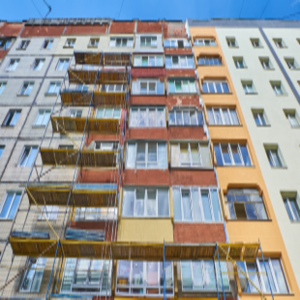Supporting the national energy efficiency fund and the climate-friendly reform agenda (S2I) in Ukraine
The building sector is the largest energy consumer in Ukraine with a share of 33%, followed by the industry and transport sectors. With the support of the BMWK and the EU Commission, the Ukrainian government has developed a concept for an Energy Efficiency Fund (EEF) that finances energy efficiency measures for buildings. This is intended to reduce energy costs of households. Poorer households also need fewer energy-related subsidies. The resulting savings in the state budget are in turn reinvested in further energy efficiency measures (S2I principle). The aim of the project is to support the Ukrainian government in the further strategic development of the Energy Efficiency Fund (EEF) with the aim of visibly increasing the contribution of the EEF to the achievement of the climate targets. Thus, the project implements targeted technical capacity building of both the EEF staff and those implementing the projects (applicants, energy auditors and construction companies).
- Countries
- Ukraine
- IKI funding
- 7,300,000.00 €
- Duration
- 05/2018 till 03/2025
- Status
- open
- Implementing organisation
- Deutsche Gesellschaft für Internationale Zusammenarbeit (GIZ) GmbH
- Political Partner
-
- Ministry of Regional Development, Construction and Communal Living - Ukraine*
State of implementation/results
- In 2018 and 2019, the structure of the Energy Efficiency Fund (EEF) was established and Germany, the EU and Ukraine did the first payments to it. In 08/2019, the "Energodim" program was launched under the EEF to provide grants to homeowners' associations for thermal modernization measures in large apartment buildings.
- In the initial phase, Energodim offered a "First Movers" program to additionally support the first 15 participants by covering their project preparation costs. To date, seven of these homeowners' associations have completed the modernizations.
- A total of 139 EEF financed modernization projects were completed by February 2024. The annual CO2 reduction of the completed projects amounts to 21.1 tCO2 per year. The total costs of the completed projects amount to circa UAH 791 million (approx. EUR 19 million).
- Since 04/2019, 114 trainers for energy auditors have been trained at 34 universities in Ukraine, who in turn have conducted 57 training courses with a total of 606 participants. In 2021, a manual for the training of energy auditors of multi-family buildings was developed for the partner universities as part of the EEF. Based on this experience, three online seminars were held in October 2021 for 91 Ukrainian construction experts to strengthen the quality of service providers in the proper thermal insulation of multi-family buildings.
- The project supports the digitalization of the EEF. Since February 2020, funding applications can be submitted and tracked online. A digital marketplace for brokering construction services between homeowners and construction companies has been available since 05/2023. At the end of 2023, an online calculator was introduced for the preliminary calculation of project and finance costs.
- The ongoing armed conflict following the Russian invasion of Ukraine since February 2022 has had a major impact on the project implementation. Thousands of residential buildings have been destroyed or severely damaged as a result of the war. In 11/2022, the EEF set up the "VidnovyDIM" program, which is financed exclusively by the EU, to quickly repair war damage. As an emergency aid measure, this is not linked to energy efficiency gains. The EEF is continuing the Energodim program. However, the conditions for building renovation projects have deteriorated significantly, primarily due to planning uncertainty and increased construction and financing costs.
- In 12/2023, the EEF Supervisory Board published a new strategy for the period 2024-2026 that takes into account these new framework conditions: In the pessimistic scenario, 369 buildings are to be renovated in 2024-2026, in the optimistic scenario 808 buildings.
- By the end of 2023, the project successfully managed the "IKI Interface Ukraine". The interface promoted intensive exchange between all active IKI implementing organizations in Ukraine through workshops, newsletters and communication products, such as the website www.iki-ukraine.org.
Latest Update:
05/2024
Project relations
Legend:
The link has been copied to the clipboard





![[Translate to English:]](/fileadmin/_processed_/2/e/csm_203230301_Ukraine_shutterstock_1331092814_FN_ed7d1440cb.jpg)

